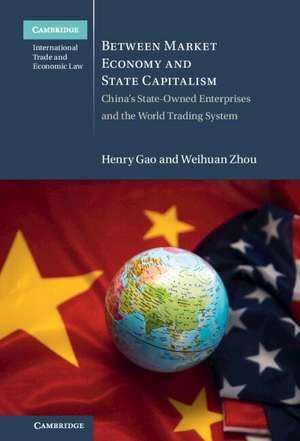Between Market Economy and State Capitalism: China's State-Owned Enterprises and the World Trading System: Cambridge International Trade and Economic Law
Autor Henry Gao, Weihuan Zhouen Limba Engleză Hardback – 23 noi 2022
| Toate formatele și edițiile | Preț | Express |
|---|---|---|
| Paperback (1) | 202.14 lei 6-8 săpt. | |
| Cambridge University Press – 14 noi 2024 | 202.14 lei 6-8 săpt. | |
| Hardback (1) | 636.34 lei 6-8 săpt. | |
| Cambridge University Press – 23 noi 2022 | 636.34 lei 6-8 săpt. |
Din seria Cambridge International Trade and Economic Law
-
 Preț: 177.62 lei
Preț: 177.62 lei -
 Preț: 271.22 lei
Preț: 271.22 lei -
 Preț: 284.39 lei
Preț: 284.39 lei - 23%
 Preț: 692.51 lei
Preț: 692.51 lei -
 Preț: 177.47 lei
Preț: 177.47 lei - 14%
 Preț: 699.45 lei
Preț: 699.45 lei -
 Preț: 216.93 lei
Preț: 216.93 lei - 14%
 Preț: 698.61 lei
Preț: 698.61 lei -
 Preț: 321.52 lei
Preț: 321.52 lei -
 Preț: 272.97 lei
Preț: 272.97 lei -
 Preț: 323.05 lei
Preț: 323.05 lei - 14%
 Preț: 868.71 lei
Preț: 868.71 lei -
 Preț: 292.88 lei
Preț: 292.88 lei -
 Preț: 288.42 lei
Preț: 288.42 lei - 23%
 Preț: 641.51 lei
Preț: 641.51 lei -
 Preț: 178.30 lei
Preț: 178.30 lei -
 Preț: 432.05 lei
Preț: 432.05 lei -
 Preț: 320.17 lei
Preț: 320.17 lei - 23%
 Preț: 753.36 lei
Preț: 753.36 lei - 23%
 Preț: 616.00 lei
Preț: 616.00 lei - 14%
 Preț: 703.74 lei
Preț: 703.74 lei -
 Preț: 285.37 lei
Preț: 285.37 lei - 14%
 Preț: 699.45 lei
Preț: 699.45 lei - 14%
 Preț: 786.62 lei
Preț: 786.62 lei -
 Preț: 314.83 lei
Preț: 314.83 lei - 14%
 Preț: 895.68 lei
Preț: 895.68 lei - 14%
 Preț: 708.14 lei
Preț: 708.14 lei - 14%
 Preț: 1015.31 lei
Preț: 1015.31 lei - 14%
 Preț: 896.85 lei
Preț: 896.85 lei -
 Preț: 405.20 lei
Preț: 405.20 lei -
 Preț: 322.51 lei
Preț: 322.51 lei - 14%
 Preț: 727.26 lei
Preț: 727.26 lei -
 Preț: 283.79 lei
Preț: 283.79 lei - 14%
 Preț: 727.59 lei
Preț: 727.59 lei - 14%
 Preț: 785.48 lei
Preț: 785.48 lei
Preț: 636.34 lei
Preț vechi: 714.99 lei
-11% Nou
Puncte Express: 955
Preț estimativ în valută:
121.78€ • 126.67$ • 100.54£
121.78€ • 126.67$ • 100.54£
Carte tipărită la comandă
Livrare economică 14-28 aprilie
Preluare comenzi: 021 569.72.76
Specificații
ISBN-13: 9781108830065
ISBN-10: 1108830064
Pagini: 250
Dimensiuni: 158 x 235 x 18 mm
Greutate: 0.47 kg
Editura: Cambridge University Press
Colecția Cambridge University Press
Seria Cambridge International Trade and Economic Law
Locul publicării:Cambridge, United Kingdom
ISBN-10: 1108830064
Pagini: 250
Dimensiuni: 158 x 235 x 18 mm
Greutate: 0.47 kg
Editura: Cambridge University Press
Colecția Cambridge University Press
Seria Cambridge International Trade and Economic Law
Locul publicării:Cambridge, United Kingdom
Cuprins
1. China, state capitalism and the World Trading System; 2. The evolution of China's reforms of State-Owned Enterprises (1978–2020); 3. State capitalism in China's accession to the WTO: concerns and solutions; 4. The limits of general WTO rules; 5. The potential of WTO rules on industrial subsidies and China-specific obligations; 6. Emerging approaches to regulating State-Owned Enterprises: the comprehensive and progressive agreement for Trans-Pacific Partnership (CPTPP) and Post-CPTPP free trade agreements; 7. Tackling China's state capitalism: WTO litigation and trade negotiation; 8. Conclusion: the potential of multilateralism.
Recenzii
'Henry Gao and Weihuan Zhou have done the nearly impossible—unpacked the relationship between the triumph of China and the decline of the WTO while presenting a compelling challenge to the conventional wisdom that WTO rules are inadequate to address Chinese state capitalism. A must read for those looking to understand how China's economic model impacts the world and its trading system.' Jennifer Hillman, Co-Director of Center of Inclusive Trade and Development and Professor from Practice, Georgetown University Law Center
'This is a very useful contribution destined for all students and practitioners of international trade. The authors address the core question that has been recently plaguing the world trading regime, namely, to what extent the regime choice is prejudged by the letter and the spirit of the current multilateral disciplines. It is no exaggeration that that the future policy relevance of the WTO hinges on the response to this question.' Petros C. Mavroidis, Edwin B. Parker Professor of Foreign & Comparative Law, Columbia Law School, New York City
'This is a very useful contribution destined for all students and practitioners of international trade. The authors address the core question that has been recently plaguing the world trading regime, namely, to what extent the regime choice is prejudged by the letter and the spirit of the current multilateral disciplines. It is no exaggeration that that the future policy relevance of the WTO hinges on the response to this question.' Petros C. Mavroidis, Edwin B. Parker Professor of Foreign & Comparative Law, Columbia Law School, New York City
Notă biografică
Descriere
The WTO provides tools to address China's state capitalism and should be the preferred forum for negotiations on SOE's and industrial subsidies.
